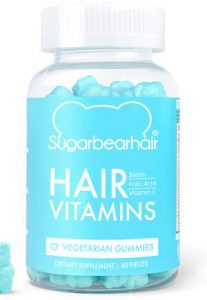Prenatal Vitamins are not just for expectant mothers anymore. If you’re looking for the best hair supplements for women, there are great options for you. The hair growth benefits of these supplements have been known for a while. Check this guide for you.

Pregnant vits may contain multiple certain nutrients necessary to promote healthy hair growth and are usually abundant in many different prenatal supplements. Prenatal vitamins for hair growth intake can benefit your hair in many ways; they can help you grow thicker, longer, and healthier locks by promoting healthy follicle production and reducing inflammation on your scalp. But not all of them have hair growth nutrients.
What Are Pregnancy Prenatal Vitamins?
A prenatal multivitamin contains a wide range of vitamins and minerals to ensure that your unborn child receives the nutrition he or she needs to thrive. When a woman is pregnant, her daily nutritional needs increase, especially calcium, folic acid (folate), and iron. Folic acid levels in a woman’s body can help to prevent serious birth abnormalities in a baby’s spine and brain. Baby growth, maturation, and healthy adulthood all depend on the right intake of vitamins and minerals, including iron, calcium, and folic acid. Women need to take folic acid every day, starting before they are pregnant because vitamins containing folic acid can help prevent neural tube defects or NTDs. Moreover, choline plays an important role in baby development, so you also have to take it.
In pregnant women with low vitamin D levels, vitamin D vitamins may promote fetal growth and lower the risk of gestational diabetes, preterm birth, and small-for-gestational-age birth. Thus, taking prenatal vitamins containing Vitamin D and minerals is linked with extensive benefits. Also, before you become pregnant, make sure you have a good diet and regular exercise so that you can provide a healthy environment for your unborn child. It’s important to keep note of how much prenatal vitamins you take each day.
Prenatal Vitamins For Hair Growth
So, are prenatal vitamins important? We’ve all seen it: the halo around many pregnant women: They don’t need any makeup to make their skin glow, and it’s as if they’ve grown their supermodel hair overnight; it’s thick, vibrant, and healthy-looking.
Since taking prenatal vitamins is an important aspect of staying healthy throughout pregnancy, you might be wondering if doing so would also positively affect your appearance, such as promoting hair development. Find out if adding prenatal vitamins for hair growth is worth it.
- Pre-baby vitamins are crucial for pregnant mothers as they serve as a comprehensive pregnancy vits, containing essential pregnancy nutrients like omega 3 fatty acids and vitamin B12. Take a pre-baby vitamin supplement recommended by your healthcare provider. Pre-baby vitamins typically contain essential nutrients like folic acid, iron, calcium, and other vitamins crucial for fetal development during pregnancy. Take them as prescribed to ensure you meet your pregnancy nutritional needs.
- They support fetal brain development and overall fetal health during pregnancy, underlining the importance of incorporating pregnancy vitamins into pregnancy care routines. Maintain sufficient levels of vitamin D and calcium while you’re pregnancy for the development of the baby’s bones and teeth. Include sources like fortified dairy products, leafy greens, and exposure to sunlight for vitamin D. If necessary, your pre-baby healthcare provider may suggest pregnancy vitamins.
- It keeps you hair shiny even when pregnant. During pregnancy, women’s hair might alter in texture and even color, with some experiencing straightening of existing curls or new hair growing in that is curlier than expected.
- It helps baby’s hair development while you’re pregnant. During the nine months of pregnancy leading up to childbirth, the hair growth cycle slows to a crawl, and all of the hair that would have ordinarily been shed ends up in your brush and shower drain.
- Include other pregnancy vitamin sources of omega-3 fatty acids, such as fatty fish (like salmon), chia seeds, and walnuts, to support the development of the baby’s brain and eyes while you’re pregnant. Omega-3 vits like fish oil may be recommended by your healthcare provider during pregnancy if dietary intake is insufficient.
These prenatal vitamins are commonly used to promote hair development during pregnancy. It is possible to hypothesize that the same vitamins and nutrients a pregnant woman takes while caring for a little one in her body would also benefit a woman who is not pregnant or even attempting to get pregnant.
However, consider the following: High quantities of some nutrients over a lengthy period of time may potentially be dangerous if you’re not pregnant or planning to get pregnant, according to the Mayo Clinic.
 Source: world.openfoodfacts.org
Source: world.openfoodfacts.org
Hair Nutrients in These Supplements
The other hot topic is biotin. Vitamin B-7, or biotin, is sometimes referred to as “hair food” because it supports the metabolism of carbohydrates, proteins, and fats. Unless you’re a vegan, it’s rare to be deficient in biotin. Skin doctors and hair specialists typically agree that biotin insufficiency results in strand breakage rather than root or subcutaneous hair loss when discussing biotin’s role in hair health.
Pregnancy Prenatal Vitamins For Shiny Hair
Taking too much prenatal vitamins can be harmful, so always consult your doctor. Also, don’t take gummy vitamins though because they contain sugar. Here are a few illustrations:
- The symptoms of a B-12 deficiency might be masked by taking too much folic acid as pre-baby vitamins, delaying crucial identification and treatment.
- According to Devika Icecreamwala M.D., F.A.A., high folic acid doses as one of pre-baby vitamins may promote cancerous cells’ growth over time.
- Rashes and digestive problems, such as constipation and diarrhea, might occur if you take too much biotin as part of your pregnancy vitamins.
 Source: flickr.com
Source: flickr.com
Dr. St. Surin-Lord said the following about these supplements taken outside of pregnancy said when it comes to the human body, childbirth is viewed as a harrowing experience. This stress leads hair follicles to enter the telogen (resting) phase of the hair cycle, resulting in hair loss. This results in significant hair shedding and loss.
 Source: pexels.com
Source: pexels.com
Prenatal Vitamins For A Healthy Baby
Prenatal Vitamins FAQs
What happens if you don’t take prenatal vitamins?
There might be health issues that your child may have if you do not start taking pre-baby vitamins based on health care providers. Your baby might develop neural tube defects when the skull and brain of your baby do not form properly.
A baby’s brain development relies on the consumption of essential fat found naturally in breast milk or formula, emphasizing the importance of a balanced diet for infants. Talk to your doctor about what good nutrition means for pregnant women. Ask about vitamin E, vitamin B6, and taking an extra vitamin to ensure you’re healthy.
How long do you need to take pre-baby vitamins?
Most experts and health care provider suggest that pregnant women must continue taking a prenatal vitamins during the term of their pregnancy. Also, if they intend to breastfeed, they must start taking prenatal vitamins that are FDA approved during the time of their breastfeeding.
Do I need a multivitamin if I’m taking a prenatal vitamins?
A prenatal vitamins are already a multivitamin that a pregnant women can take during their pregnancy. But, while morning sickness, you should not take vitamins with an empty stomach.
Is it OK to miss pre-baby supplements for a week?
Most pre-baby vits are important for a healthy pregnancy. If you skip taking a supplement, it is alright. However, you must eat a healthy diet with foods rich in all the nutrients including vitamins such as Viatmin D, and C. Vitamin D and minerals such as folic acid for healthy spinal cord and iron are good for pregnant women as it can reduce the risk of gestational diabetes, pre-eclampsia, postpartum hemorrhage and low birth weight.
Can I skip pre-baby vitamin for a day?
Skipping a daily prenatal vitamins once is fine. On the other and, eating healthy foods as replacement is essential for pregnant women.
Is it better to take a prenatal or multivitamin?
A health care provider suggests that it is better to take a best prenatal vitamins than a multivitamin.
Do prenatal pills cause weight gain?
Prenatal vitamins including the best dietary supplements can increase weight. There is no evidence found that the best pre-baby supplements or dietary supplements can gain weight.
What benefits does prenatal vitamin have?
The best prenatal vitamins have more folic acid, iron and calcium. The folic acid can prevent neural tube defects. Also, folic acid is important in any diet. Folic acid supports the fetal brain development and spinal cord.
What are the 3 benefits of prenatal care?
The three benefits of prenatal care such as supplements and minerals are the following:
- Vitsrevent birth defects and lessens the fetus and infant’s risk for any complications.
- Lessens the risk of pregnant women in having pregnancy complications.
- Ensure the medications that women consume are safe.
10. Is it too late to take Prenatal vits and minerals at 5 weeks?
It is never too late to take prenatal vits and minerals. This is because your baby is growing during the whole pregnancy period.
Is It OK To Take Supplements Even Though I Do Not Have A Baby In My Tummy?
Is It OK To Take Folic Acid Even When I’m Not Having A Baby?
What Are 3 Benefits Of Folic Acid And Why Should I Take It?
What Happens If You Don’t Take Supplements At All?
What Is The Difference Between The Supplements For Expectant Moms And Before That?
Supplements For New Moms Resources:
We hope you like our guide for hair growth when expecting a baby. Bookmark Family Hype for more health tips.
Last Updated on April 24, 2023 by Mary Cimeni
DISCLAIMER (IMPORTANT): This information (including all text, images, audio, or other formats on FamilyHype.com) is not intended to be a substitute for informed professional advice, diagnosis, endorsement or treatment. You should not take any action or avoid taking action without consulting a qualified professional. Always seek the advice of your physician or other qualified health provider with any questions about medical conditions. Do not disregard professional medical advice or delay seeking advice or treatment because of something you have read here a FamilyHype.com.